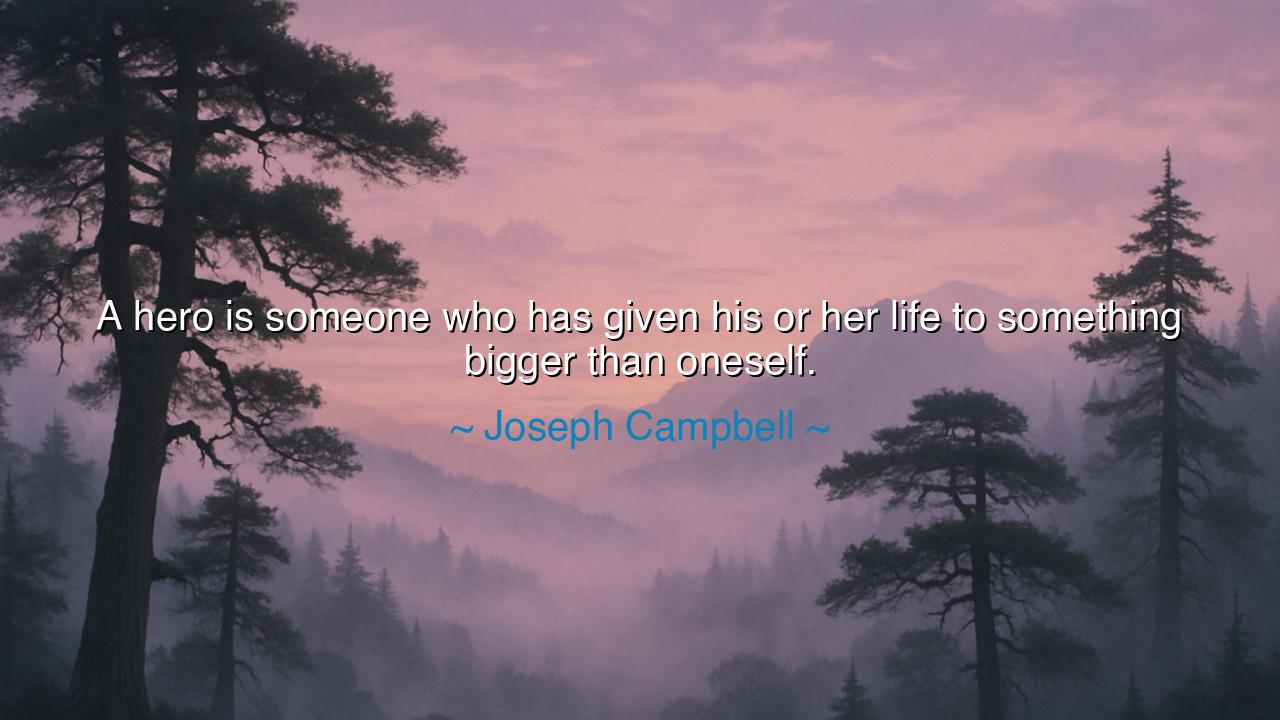
A hero is someone who has given his or her life to something






In the immortal words of Joseph Campbell, the great mythologist and interpreter of the human soul, we find a truth as old as fire itself: “A hero is someone who has given his or her life to something bigger than oneself.” This is not merely a description of courage; it is a definition of purpose. For Campbell, the hero is not only the warrior who faces danger on the battlefield, but any soul who dares to step beyond the boundaries of self-interest, to sacrifice comfort for meaning, to serve something eternal rather than fleeting. In these few words, he captures the essence of the hero’s journey, a path that all of us are called to walk — not through distant lands or mythic trials, but through the landscapes of our own hearts.
The origin of this quote lies in Campbell’s lifelong study of world mythology, which revealed a universal pattern running through the legends of every culture — the “monomyth,” or the hero’s journey. From the epics of Gilgamesh and the trials of Hercules to the enlightenment of the Buddha and the compassion of Christ, Campbell saw that all true heroes share one sacred trait: they give themselves to a cause greater than their own survival. Whether it is the salvation of a people, the pursuit of truth, or the defense of justice, their lives are offered — willingly or not — to something vast and transcendent. Thus, the hero is not defined by victory or power, but by sacrifice and devotion.
To “give one’s life” does not always mean to die, but to dedicate — to pour the essence of one’s being into a mission that outlives the self. The mother who endures hardship to nurture her child, the teacher who devotes decades to shaping young minds, the artist who surrenders sleep and peace to create something beautiful for the world — these, too, are heroes in Campbell’s sense. The fireman who rushes into the burning building and the monk who spends his life in silent service to the divine — both embody the same spirit. They have stepped beyond the small circle of “I” and entered the vast horizon of “we.”
History offers us countless examples of this truth made flesh. Consider Mahatma Gandhi, who gave not just his life but his entire being to the cause of freedom through nonviolence. His power lay not in armies or wealth, but in the moral force of his conviction. When beaten, he did not strike back; when imprisoned, he did not curse his captors. His weapon was truth, and his battlefield was the conscience of humanity. In giving himself to an ideal greater than his own safety, he became a beacon of courage for all generations. Gandhi’s heroism, like that of all true heroes, was not born of conquest, but of surrender — the surrender of ego to a higher calling.
Campbell’s wisdom also reminds us that the hero’s path is not reserved for the chosen few, but open to all. The journey begins when a person feels the call — the call to rise above mediocrity, to face the unknown, to answer a need in the world. It may come as a whisper or a storm, but it demands a response. Those who accept it leave behind the comfort of the familiar and enter the realm of trial — the struggles that refine the soul. Along the way, they discover that the true enemy is not the dragon outside, but the fear within. And when they conquer it, they return transformed — not richer, but wiser, not celebrated, but whole.
Yet, the path of the hero requires courage not just in grand moments, but in the quiet hours of daily life. To give oneself to something bigger might mean to act with kindness when the world is cruel, to forgive when the heart cries for vengeance, to persist when failure seems certain. Every act of goodness, every choice made in love rather than selfishness, is a small death of the old self — and a birth of the heroic spirit. Campbell teaches us that the divine spark within us shines brightest when we live not for gain, but for meaning.
Let this, then, be the lesson of Joseph Campbell’s words: each life holds the potential for heroism. You need not slay monsters or command armies — it is enough to confront your own fear, to lift another from despair, to stand for what is right when silence would be easier. The measure of a hero is not found in glory, but in service; not in strength, but in sacrifice. Ask yourself, each morning, “What greater thing shall I give my life to today?” and then give yourself wholly, without hesitation, without regret.
And so, dear listener, remember — to live only for oneself is to live small and perish unnoticed, but to live for something greater is to join the lineage of the eternal. The hero’s gift is not his life or death, but his example — that courage and love, when united, can remake the world. As Joseph Campbell reminds us, the fountain of heroism lies not in destiny, but in decision. Look within, find your cause, and give yourself to it — for there is no nobler way to live, and no more enduring way to die.






AAdministratorAdministrator
Welcome, honored guests. Please leave a comment, we will respond soon